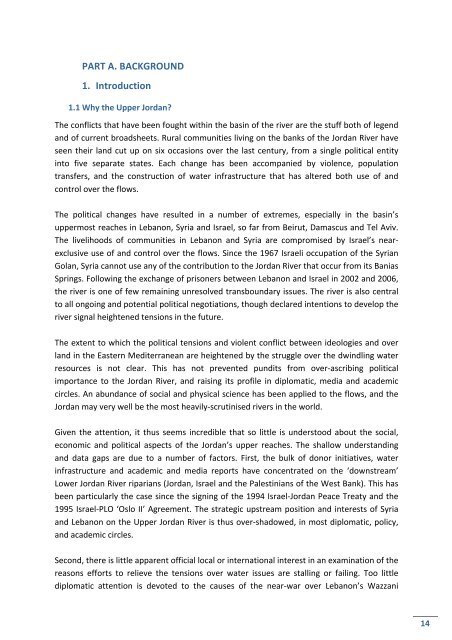Hydro-‐political Baseline of the Upper Jordan River - Ibrahim Abd El Al
Hydro-‐political Baseline of the Upper Jordan River - Ibrahim Abd El Al
Hydro-‐political Baseline of the Upper Jordan River - Ibrahim Abd El Al
Create successful ePaper yourself
Turn your PDF publications into a flip-book with our unique Google optimized e-Paper software.
PART A. BACKGROUND<br />
1. Introduction<br />
1.1 Why <strong>the</strong> <strong>Upper</strong> <strong>Jordan</strong>?<br />
The conflicts that have been fought within <strong>the</strong> basin <strong>of</strong> <strong>the</strong> river are <strong>the</strong> stuff both <strong>of</strong> legend<br />
and <strong>of</strong> current broadsheets. Rural communities living on <strong>the</strong> banks <strong>of</strong> <strong>the</strong> <strong>Jordan</strong> <strong>River</strong> have<br />
seen <strong>the</strong>ir land cut up on six occasions over <strong>the</strong> last century, from a single political entity<br />
into five separate states. Each change has been accompanied by violence, population<br />
transfers, and <strong>the</strong> construction <strong>of</strong> water infrastructure that has altered both use <strong>of</strong> and<br />
control over <strong>the</strong> flows.<br />
The political changes have resulted in a number <strong>of</strong> extremes, especially in <strong>the</strong> basin’s<br />
uppermost reaches in Lebanon, Syria and Israel, so far from Beirut, Damascus and Tel Aviv.<br />
The livelihoods <strong>of</strong> communities in Lebanon and Syria are compromised by Israel’s near-‐<br />
exclusive use <strong>of</strong> and control over <strong>the</strong> flows. Since <strong>the</strong> 1967 Israeli occupation <strong>of</strong> <strong>the</strong> Syrian<br />
Golan, Syria cannot use any <strong>of</strong> <strong>the</strong> contribution to <strong>the</strong> <strong>Jordan</strong> <strong>River</strong> that occur from its Banias<br />
Springs. Following <strong>the</strong> exchange <strong>of</strong> prisoners between Lebanon and Israel in 2002 and 2006,<br />
<strong>the</strong> river is one <strong>of</strong> few remaining unresolved transboundary issues. The river is also central<br />
to all ongoing and potential political negotiations, though declared intentions to develop <strong>the</strong><br />
river signal heightened tensions in <strong>the</strong> future.<br />
The extent to which <strong>the</strong> political tensions and violent conflict between ideologies and over<br />
land in <strong>the</strong> Eastern Mediterranean are heightened by <strong>the</strong> struggle over <strong>the</strong> dwindling water<br />
resources is not clear. This has not prevented pundits from over-‐ascribing political<br />
importance to <strong>the</strong> <strong>Jordan</strong> <strong>River</strong>, and raising its pr<strong>of</strong>ile in diplomatic, media and academic<br />
circles. An abundance <strong>of</strong> social and physical science has been applied to <strong>the</strong> flows, and <strong>the</strong><br />
<strong>Jordan</strong> may very well be <strong>the</strong> most heavily-‐scrutinised rivers in <strong>the</strong> world.<br />
Given <strong>the</strong> attention, it thus seems incredible that so little is understood about <strong>the</strong> social,<br />
economic and political aspects <strong>of</strong> <strong>the</strong> <strong>Jordan</strong>’s upper reaches. The shallow understanding<br />
and data gaps are due to a number <strong>of</strong> factors. First, <strong>the</strong> bulk <strong>of</strong> donor initiatives, water<br />
infrastructure and academic and media reports have concentrated on <strong>the</strong> ‘downstream’<br />
Lower <strong>Jordan</strong> <strong>River</strong> riparians (<strong>Jordan</strong>, Israel and <strong>the</strong> Palestinians <strong>of</strong> <strong>the</strong> West Bank). This has<br />
been particularly <strong>the</strong> case since <strong>the</strong> signing <strong>of</strong> <strong>the</strong> 1994 Israel-‐<strong>Jordan</strong> Peace Treaty and <strong>the</strong><br />
1995 Israel-‐PLO ‘Oslo II’ Agreement. The strategic upstream position and interests <strong>of</strong> Syria<br />
and Lebanon on <strong>the</strong> <strong>Upper</strong> <strong>Jordan</strong> <strong>River</strong> is thus over-‐shadowed, in most diplomatic, policy,<br />
and academic circles.<br />
Second, <strong>the</strong>re is little apparent <strong>of</strong>ficial local or international interest in an examination <strong>of</strong> <strong>the</strong><br />
reasons efforts to relieve <strong>the</strong> tensions over water issues are stalling or failing. Too little<br />
diplomatic attention is devoted to <strong>the</strong> causes <strong>of</strong> <strong>the</strong> near-‐war over Lebanon’s Wazzani<br />
14


